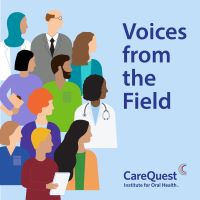Enter your email to receive the CareQuest newsletter:
July 5, 2022
Danica Loring, EFDA, CDA, works as a dental practice manager at Penobscot Community Health Care (PCHC) Dental Center, a nonprofit in Maine. She helps PCHC achieve its mission of providing comprehensive, integrated primary health care services to improve the health and well-being of patients in the Maine community. Danica’s 15-year career as a dental assistant helped hone her passion for direct patient care. In her new role, she oversees PCHC’s Dental Assisting Training Program, which provides on-the-job training to new dental assistants.
 Danica took some time out of her busy schedule to share her perspective on the recent success of a multiyear effort in Maine to extend dental coverage to low-income adults — and the role dental assistants can play in curbing the workforce shortage. (On July 1, MaineCare, the state’s Medicaid program, will expand dental coverage for adults and increase reimbursement rates for dental providers.) Below, Danica explains the details of the training program and other workforce challenges facing the oral health industry.
Danica took some time out of her busy schedule to share her perspective on the recent success of a multiyear effort in Maine to extend dental coverage to low-income adults — and the role dental assistants can play in curbing the workforce shortage. (On July 1, MaineCare, the state’s Medicaid program, will expand dental coverage for adults and increase reimbursement rates for dental providers.) Below, Danica explains the details of the training program and other workforce challenges facing the oral health industry.
To your knowledge, how long has the dental assistant shortage existed in Maine? How does the shortage affect patient care?
It has been challenging for some time to find an experienced dental assistant in Maine. When the COVID-19 pandemic arrived, the shortage certainly experienced a new high and directly impacted patient care. The shortage affects the number of patients providers can see within a given day. Without enough assistants, a provider’s daily workflow is interrupted, which means others must take on additional responsibilities that result in overworked and exhausted staffs.
Can you explain how the PCHC Dental Assisting Training Program works to help address the dental workforce shortage?
The program is unique because it’s small and the candidates (no more than six at a time to ensure adequate training) don’t have direct experience in dentistry, but they are patient-centered and are eager to learn.
First, PCHC uses an outside consultant to execute the training programs. There are weekly morning training sessions composed of didactic work and hands-on training where candidates learn the fundamentals of infection control, four-handed dental assisting, terminology, and dental software. The candidates are then integrated into our clinical staff, including shadowing dental assistants. By the middle of the program, the trainees are sitting chairside with another assistant available to oversee them assisting in basic restorative procedures. By the end of the program, they assist in extractions, root canals, and other procedures. During the program, candidates also gain the knowledge and education to complete radiation health and safety exams through the Dental Assisting National Board. This ultimately allows them to apply for their Maine Dental Radiographer License.
Afterward, the clinical operations supervisors continue to work with candidates as needed. During the program, candidates gain the knowledge and education to complete radiation health and safety exams through the Dental Assisting National Board. This ultimately allows them to apply for their Maine Dental Radiographer License.

How do you think the expanded adult dental benefit will impact your work?
We are excited and preparing as much as possible. On July 1, Maine’s MaineCare system will be expanding their covered services to patients 21 years old and older. The expansion of services has been long overdue. While PCHC accepts MaineCare patients, unfortunately, there is a limited amount of other dental facilities that do, limiting overall accessibility for these patients. There is still a lot to work through for more people to gain accessibility and coverage.
What does gaining comprehensive dental coverage mean for the health of individuals with Medicaid in the state of Maine?
It creates equity for those that once didn’t have access to the same care as others. It gives adults access to preventive care that, in return, impacts not only their oral health but their entire well-being. It also allows individuals to have good experiences with dental facilities rather than experiencing them only in the case of an emergency and when in pain. Are there other workforce challenges or shortages you are seeing within oral health? Throughout the pandemic, the dental community faced challenges. The entire staff, including the front office assistants, hygienists, assistants, and providers have been on a roller coaster for over two years now. Dental teams are overworked and exhausted yet continue ahead at full speed. It’s important as leaders in the field to find ways to support staffs with resources to feel appreciated.